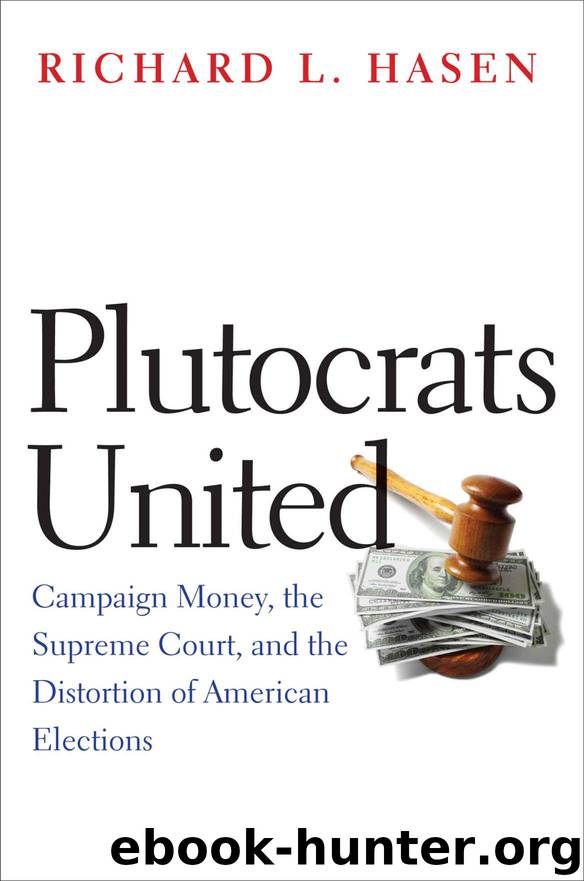Plutocrats United: Campaign Money, the Supreme Court, and the Distortion of American Elections by Richard L. Hasen

Author:Richard L. Hasen
Language: eng
Format: mobi
Publisher: Yale University Press
Published: 2016-01-27T22:00:00+00:00
“We have consistently rejected the proposition that the institutional press has any constitutional privilege beyond that of other speakers.” So declared the Supreme Court in Citizens United (quoting Justice Scalia’s Austin dissent), in a statement Robert Post called “manifestly incorrect” and Iowa professor Randall Bezanson called “stunningly incorrect.” Much turns on whose judgment about the meaning of the Press Clause is right.20
Post pointed to the Supreme Court’s decision in Minneapolis Star v. Minneapolis Commissioner, a 1983 case, which held unconstitutional under the First Amendment a tax applied uniquely against the institutional press. As he explained, “States can impose unique taxes on virtually every kind of business, including non-press communicative businesses like film distributors, but they are constitutionally prohibited from imposing a singular tax on the press.” Here, the Court recognized that the press serves as an “important restraint on government.” Professor Bezanson wrote that Kennedy’s opinion “does not address numerous earlier cases that arguably support the opposite conclusion, albeit often in dicta.”21
Other Supreme Court cases also have protected the editorial function of the press, but have not necessarily limited these protections to the press as an institution. In Mills v. Alabama, the Court struck down an Alabama law that made it a crime to publish newspaper editorials on election day urging people to vote in a certain way on issues submitted to them. Alabama had argued that the law was a reasonable restriction to protect the public from last-minute charges that could not be responded to by those attacked. Assuming without deciding that Alabama’s interest was legitimate, the Court noted a lack of narrow tailoring: “The state statute leaves people free to hurl their campaign charges up to the last minute of the day before the election. The law . . . then goes on to make it a crime to answer those ‘last-minute’ charges on election day, the only time they can be effectively answered.”22
The Court in Mills also stated that the “Constitution specifically selected the press . . . to play an important role in the discussion of public affairs.” It recognized the role of the press “as a powerful antidote to any abuses of power by governmental officials and as a constitutionally chosen means for keeping officials elected by the people responsible to all the people whom they were selected to serve.”23
Similarly, in Miami Herald Publishing Co. v. Tornillo, in 1974, the Court struck down a Florida law that granted a political candidate a right to equal space to answer criticism and attacks on his record in a newspaper. Advocates of this law argued that it was intended to “ensure that a wide variety of views reach the public.” Although the Court noted the rise of monopoly power in the newspaper industry, Chief Justice Warren Burger’s majority opinion rejected the argument: “A responsible press is an undoubtedly desirable goal, but press responsibility is not mandated by the Constitution and like many other virtues it cannot be legislated.” He concluded that “it has yet to be demonstrated how
Download
This site does not store any files on its server. We only index and link to content provided by other sites. Please contact the content providers to delete copyright contents if any and email us, we'll remove relevant links or contents immediately.
| Anthropology | Archaeology |
| Philosophy | Politics & Government |
| Social Sciences | Sociology |
| Women's Studies |
The Secret History by Donna Tartt(19058)
The Social Justice Warrior Handbook by Lisa De Pasquale(12187)
Thirteen Reasons Why by Jay Asher(8894)
This Is How You Lose Her by Junot Diaz(6877)
Weapons of Math Destruction by Cathy O'Neil(6267)
Zero to One by Peter Thiel(5789)
Beartown by Fredrik Backman(5737)
The Myth of the Strong Leader by Archie Brown(5500)
The Fire Next Time by James Baldwin(5432)
How Democracies Die by Steven Levitsky & Daniel Ziblatt(5216)
Promise Me, Dad by Joe Biden(5144)
Stone's Rules by Roger Stone(5081)
A Higher Loyalty: Truth, Lies, and Leadership by James Comey(4954)
100 Deadly Skills by Clint Emerson(4921)
Rise and Kill First by Ronen Bergman(4780)
Secrecy World by Jake Bernstein(4742)
The David Icke Guide to the Global Conspiracy (and how to end it) by David Icke(4709)
The Farm by Tom Rob Smith(4502)
The Doomsday Machine by Daniel Ellsberg(4485)
